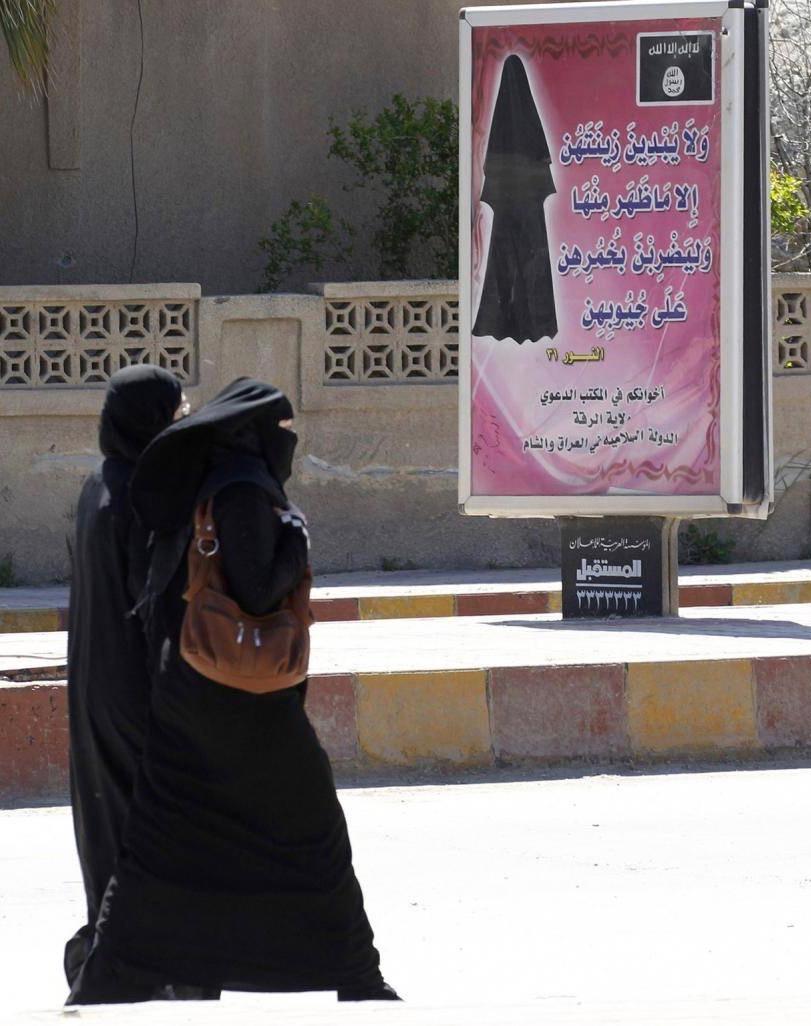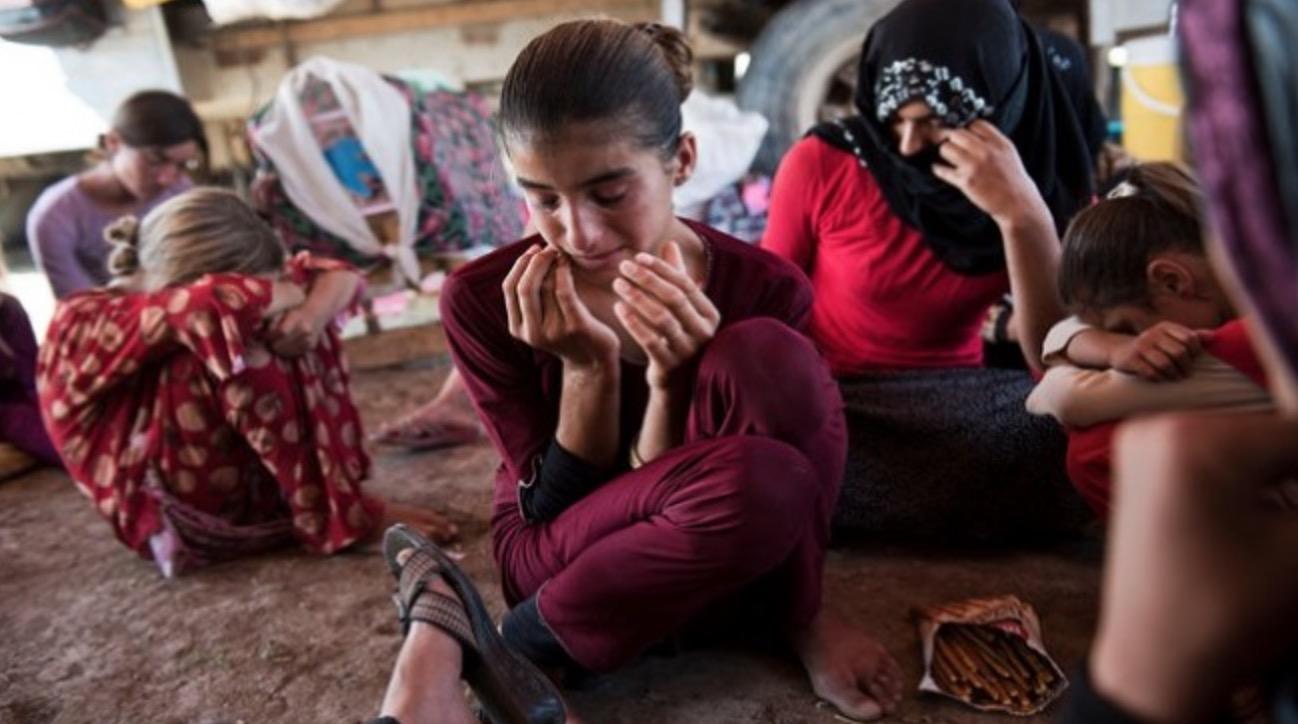Obsessive Regulation and 'Biological Minimum' in ISIS Biopolitics
archive

Obsessive Regulation and 'Biological Minimum' in ISIS Biopolitics
The dramatic rise and expansion of the Islamic State (IS) in Iraq, Syria, parts of Africa and South Asia, has generated much discussion about the group’s atrocities and geopolitical impact, as well as debates about how to respond to it—not just militarily, but in the domains of ideology and propaganda as well. Yet there has been little effort to understand IS as a power. What do IS’s practices, beliefs, and propaganda tell us about it as a form of power? And equally important, how has IS conceived of itself as a power? This article is an attempt to shed light on IS’s exercise of power, looking specifically at its view and treatment of women. For although IS has experienced reversals of fortune on the battlefields of Syria and Iraq, its track record has much to tell us about its particularly radical strand of Salafi jihadi ideology and practices as a power. This is a power that seeks a maximum regulation of the lives of Muslim women, down to the minute details, and exercises extreme brutality by subjecting captured non-Muslim women to an exceptional state of violence and abuse where they are reduced to their bare biological minimum.
To begin with, it is important to note that IS is at once a juxtaposition of the modern and the medieval, combining modern techniques and technologies of rule with medieval discourses and practices of power. Sifting through the pages of Dabiq, an online magazine that IS produced between July 2014 and July 2016 in such languages as English and French and targeted mostly at audiences outside IS territories, the picture that emerges of IS’s treatment and view of women—with respect to their behavior, role, and status in private and public spheres—bears the hallmarks of a biopolitical power. A biopolitical power is a broad designation that for the purposes of this essay combines elements of both Michel Foucault’s and Giorgio Agamben’s definitions and interpretations of the concept involving practices of biopower, disciplinary power, and sovereign power.
As a biopower, IS is an entity that displays an insatiable desire to control and regulate every aspect of women’s outward existence—from their bodies to behaviors and roles at home and beyond—thereby harnessing women’s reproductive capabilities and ultimately confining them to a power relationship in which they are perpetually subjugated to the males around them. In this regard IS can be seen in light of a Foucauldian definition of biopolitical power, one that seeks to take “control of both the body and life” or, indeed, to take “control of life in general—with the body as one pole and the population as the other.”1

ISIS billboard with verse from the Qur’an urging women to wear hijab. Raqqa, Syria, 2014. Reuters
As a Salafi jihadi entity committed to a strict and ultraconservative interpretation of Islam, IS imposes numerous limitations on women, ordering them to fully cover up, “lower their gaze and guard their private parts,”2 and accept polygamy.3 It furthermore promotes procreation and child raising—providing future warriors for the cause—as key objectives of women’s lives. Much of IS’s preoccupation with women and their bodies emanates from a deep preoccupation with sexuality, an area that Foucault describes as a “crucial target” of any power aiming to manage life.4 IS narrowly focuses on the reproductive function of sexuality, obsessively erasing any associations with feminine pleasure. Its obsession with sex is evident in Dabiq, where Western women are admonished for debauchery and Muslim women are directed to adopt “chastity” and “honor,” insulating them from sexual temptation.
But for those who dare to defy the rules of proper sexual conduct, IS exhibits its disciplinary side through grisly images of women stoned to death for “adultery”—corporeal reminders of the cost of ignoring the rules.
As a biopower, IS is an entity that displays an insatiable desire to control and regulate every aspect of women’s outward existence—from their bodies to behaviors and roles at home and beyond...
IS as a sovereign power
IS’s treatment of captured women reveals a different side of its biopolitics. Whereas in the case of Muslim women IS demonstrates a strong if by comparison seemingly trivial obsession with controlling individual and collective behaviors of the faithful, in the case of captive women it positions itself as a sovereign power with authority over life and death, determining the very form of life (or lack of it thereof) that captured women experience. In August 2014, IS raided the Sinjar area in northern Iraq, home to the followers of the ancient Mesopotamian Yazidi faith. What ensued has been described by the United Nations as an “ongoing genocide,”5 as IS is estimated to have massacred hundreds of Yazidis, mostly men, and captured thousands of Yazidi women and girls who have been subjected to sexual slavery.
Despite the universal outrage about these atrocities, IS proudly took responsibility for its actions against “pagan” Yazidis. The October 2014 edition of Dabiq contained the following statement: “After capture, in accordance with Shariah law, the Yazidi women and children were then divided amongst the fighters of the Islamic State who participated in the Sinjar operations.”6 Dabiq also boasted that the sexual enslavement of Yazidi women was a realization of “many divine wisdoms and religious benefits, regardless of whether people are aware of this.”7

Yazidi escapee from ISIS captivity. Source: Reuters
Treated as spoils of war by IS, the women were pressured to convert to Islam, subjected to forced marriage, torture, and sexual violence. In dealing with Yazidi women, IS effectively suspended the laws it applied to other women in its territory, thus condemning the Yazidis to what Italian philosopher Giorgio Agamben described as a “state of exception.”8 By so doing, Yazidis women were effectively reduced to “bare life,” the most basic and unprotected form of life. The concept of bare life was articulated in Agamben’s work on Nazi camps in Europe. The camp, in Agamben’s words, is “the most absolute biopolitical space ever to have been realized, in which power confronts nothing but pure life, without any mediation.”9 As such, a camp need not denote only something physical, but could refer to a metaphorical space where a brutal state of exception is enforced. What actually constitutes sovereign power—i.e. biopower in the extreme—in these spaces is not the physical annihilation of life as such, but rather a reconstitution of life reduced to its biological minimum.10
Yazidis women were effectively reduced to “bare life,” the most basic and unprotected form of life.
Through its deployment of modern technologies of rule coupled with an ethos that is medieval and traditional, IS reveals itself as an ultimate expression of a biopolitical power, obsessed with regulating, disciplining, and determining the forms of life that women are entitled to have under its reign. As a key multilingual publication of IS meant to appeal to sympathizers and potential recruits, Dabiq provides interesting clues about IS ideology and practices, how it operates as a biopolitical power. What emerges is an image of IS as a power in charge, regulating the lives of those within its territories. Whereas with Muslim women IS is chiefly concerned with organizing their lives in private and public domains and issuing recommendations on chastity, reproduction, and appeasement of male family members, in its treatment of captured Yazidi women emerges the image of an absolute sovereign power that subjects these women to a violent state of exception and extreme abuse, thus reducing their lives to a bare minimum.
1 Foucault, M. (1997). Society Must Be Defended. (Trans. D. Macey). M. Bertani,
2 Dabiq, Issue 15, p. 23 -- The fitrah of mankind and the near extinction of western
3 Dabiq, Issue 12, p. 21 -- Al-Muhajirah, U. S. (2015, Nov. 18). Two, three of four.
4 Foucault, M. (1980). The History of Sexuality. (Trans. R. Hurley,). New York,
5 “UN human rights panel concludes ISIL is committing genocide against Yazidis.”
6 Dabiq, Issue 4, p. 15 -- The revival of slavery before the hour. (2014, October 11).
7 Dabiq, Issue 9, p. 45 -- Al-Muhajirah, U. S. (2015, May 21). Slave girls or
8 Agamben, G. (2005). State of Exception. (Trans. Alvin Attell). Chicago, IL:
9 Agamben, G. (1998). Homo Sacer: Sovereign power and bare life.
10 De Larrinaga, M. & Doucet, M. G. (2008). “Sovereign power and the biopolitics



